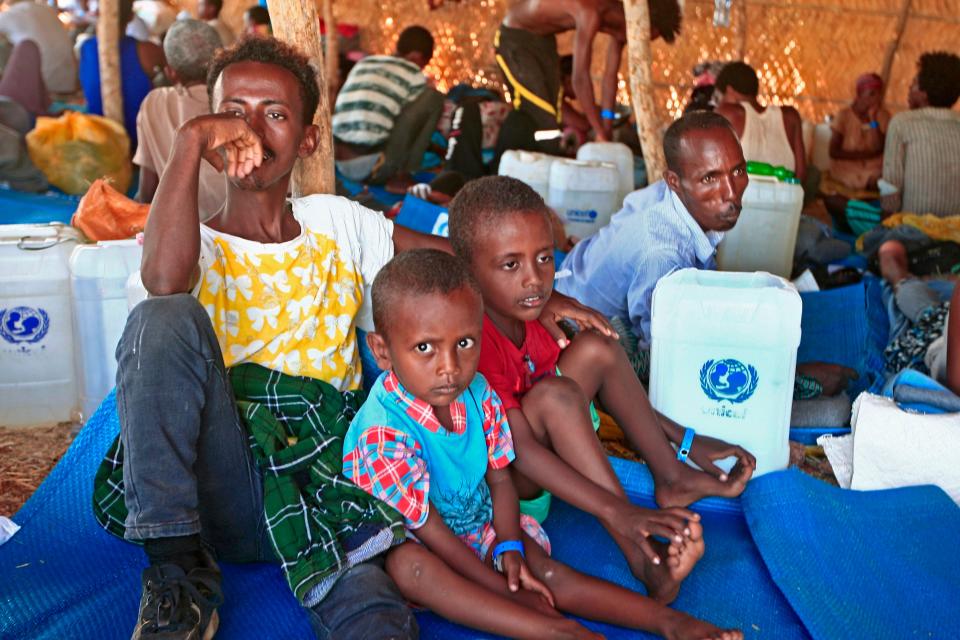Ethiopia crisis: Government army advances in Tigray as rebels vow to unleash ‘hell’

Aid agencies warn of a humanitarian disaster unfolding
(AFP via Getty Images)Ethiopian government forces have captured two towns held by rebels in the northern region of Tigray, in an escalation of violence that threatens to trigger a humanitarian catastrophe and risks engulfing the fragile Horn of Africa.
The local ruling party, the Tigray People’s Liberation Front (TPLF), warned federal forces they faced “hell”, but appeared on Wednesday to be on the back foot after the government marched on the regional capital of Mekelle.
Despite international calls for calm, both sides have been locked in a two-week battle that has killed hundreds, forced nearly 30,000 to flee to neighbouring Sudan and reignited long unresolved ethnic tensions.
Prime Minister Abiy Ahmed vowed a “final and crucial” victory after warning that a three-day deadline for Tigrayan forces to surrender had expired.
In response, TPLF leader Debretsion Gebremichael called on all Tigrayans, including children, to mobilise.
The rebels, who are massively outnumbered, insisted the loss of Shire and Axum was only a minor setback and that they had managed to successfully capture several tanks and artillery.
Aid agencies are now sounding the alarm over the “devastating” crisis unfolding in Africa’s second most populous country, with hunger on the rise with food and medicine stuck outside the region’s borders.
The government has accused rebel forces of destroying bridges connecting Mekelle with the rest of the country in an attempt to hold back federal troops.
“Thousands are crossing into Sudan seeking safety, and an untold number are displaced from their homes inside Ethiopia,” said Katia Sorin, ICRC’s head of delegation in Addis Ababa.
“The telecommunications blackout in Tigray has made it practically impossible for people to contact their family members, causing fear and anguish on the whereabouts and safety of their loved ones.”
Tigrayans fleeing the violence have accused the government of ethnic violence and targeting of civilians. The government has denied the claims.
Amnesty reported that scores of civilians were killed and wounded in machete attacks in a “massacre” in Tigray last week, but said they were unable to confirm who was responsible.

Ethiopian military advance on the northern region of Tigray on Monday
AP“When we entered, we saw a lot of dead bodies, soaked in blood, on the streets and rental dormitories frequented by seasonal workers. I am still in shock struggling to cope with the experience,” an eyewitness told the rights group.
Ethiopian peacekeepers in Somalia disarmed between 200 and 300 of their ethnic Tigrayan colleagues on Wednesday, compounding fears the conflict could soon spill over into already unstable neighbouring countries.
Ethiopia’s military, regarded as the most effective in the Horn of Africa, plays a key role in the African Union’s (AU) peacekeeping forces fighting Al-Shabaab in Somalia.
Mr Abiy, who won the Nobel Peace Prize last year, began the assault against the state of more than 5 million people on 4 November, after what he said was an attack by Tigrayan forces on a government base.
The conflict is rooted in the longstanding animosity between the central government and the TPLF, who say that Mr Aiby has removed Tigrayans from government posts since he took office in 2018.
Tensions continued to rise after the government postponed the June elections, ostensibly because of the pandemic.
Tigrayans represent about five per cent of the country’s population of 109 million and dominated the leadership between 1991 and 2018.
Read More

 Yahoo News
Yahoo News 